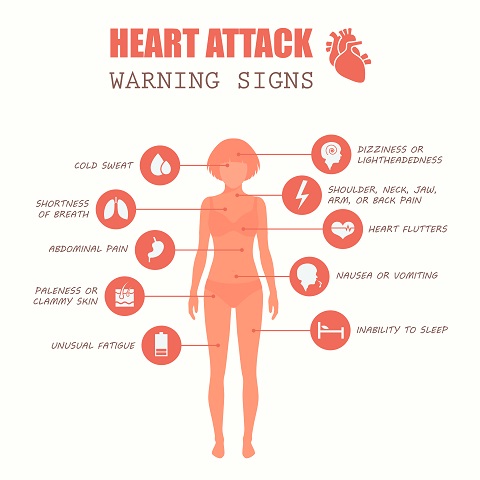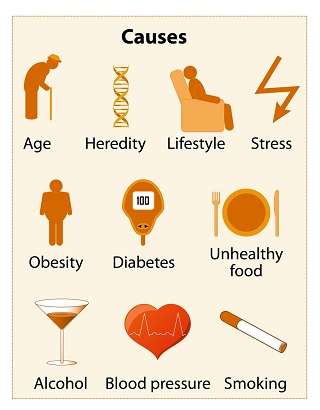 Heart disease is the leading cause of death in both men and women and is responsible for 1 in 4 deaths that occur in the United States. 70% of those that die from a heart attack never had a previous heart attack, which is why this tragedy is almost always so unexpected. While weight, age, family history, smoking, diabetes, poor diet, physical inactivity, and excessive alcohol use put people at a higher risk for heart disease, a heart attack can strike anyone at any time, so it’s vital to learn the early warning signs of a heart attack, the symptoms of a heart attack, and CPR techniques that can help someone having a heart attack.
Heart disease is the leading cause of death in both men and women and is responsible for 1 in 4 deaths that occur in the United States. 70% of those that die from a heart attack never had a previous heart attack, which is why this tragedy is almost always so unexpected. While weight, age, family history, smoking, diabetes, poor diet, physical inactivity, and excessive alcohol use put people at a higher risk for heart disease, a heart attack can strike anyone at any time, so it’s vital to learn the early warning signs of a heart attack, the symptoms of a heart attack, and CPR techniques that can help someone having a heart attack.
Symptoms of a Heart Attack
Don’t risk it if you think you might be having a heart attack, chew up an aspirin and go to the emergency room or call 9-1-1. Trained medical professionals can do a lot to lessen the impact of a heart attack, but it’s vital that you get help quickly. There are a number of symptoms commonly associated with having a heart attack.
12 Signs You’re Having a Heart Attack
- Chest Pain, Fullness, Tightness or Pressure
- Pain or Pressure in Limbs, Head, Back or Neck
- Jaw Pain or Toothache
- Lightheadedness/Dizziness
- Breaking out in a Cold Sweat
- Nausea, Stomach Pain, or Vomiting
- Extreme Fatigue
- Fainting or Loss of Consciousness
- Shortness of Breath
- Persistent Coughing or Wheezing
- Abnormalities in Breathing
- Swelling in the Feet or Ankles
Symptoms Vs. Heart Attack Warning Signs
Because the symptoms of heart attack are so broad, people often mistake a heart attack for other conditions and don’t receive treatment. It is worth noting that Women are more likely than men to experience heart attack symptoms related to nausea, fatigue, dizziness, lightheadedness, and pressure in the upper back. Be aware of these symptoms, but it’s also a good idea to look out for warning signs that a heart attack could be on the horizon, which may give the opportunity to seek help before a heart attack hits.
 9 Early Warning Signs to Be Aware of
9 Early Warning Signs to Be Aware of
- Unusual Fatigue – Daily tasks suddenly become exhausting or overwhelming.
- Shortness of Breath – A slight exertion easily puts you out of breath.
- Mood Changes – Feelings of anxiety could be your body trying to tell you something is wrong, especially when this comes with shortness of breath.
- Digestive Issues – Heartburn, nausea, and unexpected vomiting.
- Weakness – Similar to the feeling you get during the flu.
- Sleep Disturbance – Trouble falling asleep or staying asleep.
- Chest Discomfort – Pain, pressure or discomfort similar to a pulled muscle.
- Unusual Pains – Any discomfort, numbness, or tingling in unusual places like hands or limbs.
- Leg Pain – Shooting pains in the leg could be a sign of peripheral artery disease.
Detecting Heart Problems Early
If your life is in danger, call 9-1-1. If you’re concerned that you might be at risk for heart attack but don’t feel like you’re in immediate danger, go visit a doctor right away. Medication and health advice might be exactly what you need to turn things around. If you have a family, you owe it to them to understand your risks and take steps to minimize those risks. If you have any of the early warning signs of a heart attack, sticking your head in the sand and ignoring the problem won’t make it go away.
For more information about the types of testing involved in identifying heart disease, watch this brief Q&A video from a Maryland based cardiovascular specialist:
Don’t Become Another Heart Attack Statistic
Even if heart disease runs in the family, there is a great deal one can do to reduce their risk of this danger. The American Heart Association recommends eating healthy, being active, cutting cholesterol, maintaining a healthy weight, controlling blood sugar, avoiding excessive amounts of alcohol, and not smoking. If you have a family member with heart issues or high risk for heart attack, consider training everyone in the family on how to preform CPR. Contact us if you’d like to learn more about CPR training, class schedules, or certification.



